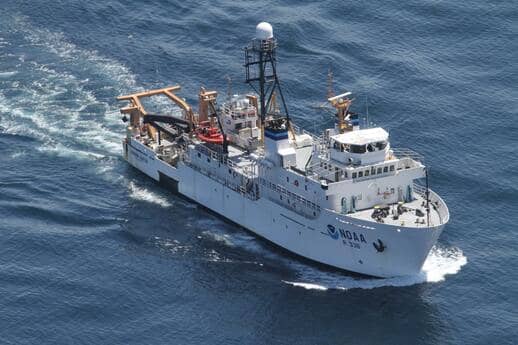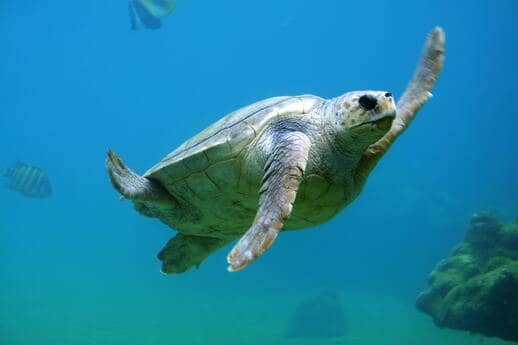- Some of the best marine biology colleges in the US are located along the coast.
- Colleges and universities that specialize in marine biology have a school dedicated to the program.
- The top two states with the most colleges offering marine biology include Florida and California.
Marine biology careers are fiercely competitive, and that makes getting the right training and preparation that much more important. Choosing the right school is a big part of that preparation. There are a number of marine biology colleges around the country that offer this program, but only a handful of those are considered the best schools in the field.
Attending one of those top schools is one of the best ways to make sure your resume stands out from all the rest, giving you the best shot at an interview, and ultimately a very satisfying career. If you are considering a career in marine biology, it is important to research potential colleges carefully. Talk to people in the field and ask about the reputation of the school you are considering. Look at people who are already successful in the marine biology field and see where they went to school, what degrees they earned, and how they worked their way up to their current positions. The more you know going in, the easier it will be to choose the right college and the right set of classes.
Marine Biology Colleges

Marine Biology Program from University of Miami
BS in Marine Biology & Ecology

Marine Biology Program from the University of Rhode Island
B.S. in Marine Biology

Marine Biology Program from the University of South Florida
B.S.in Marine Biology
Table of Contents
- Top Marine Biology Colleges
- Taking the Right Marine Biology Courses
- Factors to Consider When Choosing a Marine Biology College
- Tips for Preparing a Strong Application to Marine Biology Colleges
- Resources for Marine Biology Students
Top Marine Biology Colleges
As you would expect, some of the best and top colleges for marine biology students are located on the west coast of the United States. The proximity of these schools to the vast Pacific Ocean no doubt plays a role in their excellent marine biology programs and gives students plenty of opportunities for hands-on practical learning.

University of Washington – Aquatic and Fishery Sciences
University of Washington’s School of Aquatic and Fishery Sciences is considered one of the best in the industry. This aquatic and fishery school has an excellent selection of courses for students studying marine biology, including courses in related fields like mathematics and computers. The school covers a wide range of topics in the marine biology field which will equip you with a deep knowledge of the industry. Some of the topics include resource management, climate change, ecology, and conservation. The school offers a BS in Aquatic and Fishery Science. Beyond the undergraduate degree, the school also offers an MS in Aquatic and Fishery Science and a Ph.D. in Aquatic and Fishery Science.
Scripps Institute of Oceanography
A little further south, the University of California at San Diego, better known as the Scripps Institute of Oceanography, offers an excellent program for marine biology majors. The Scripps Institute of Oceanography is known for its work monitoring and studying the marine wildlife in the San Diego region. Staff from the institute also serve as guides on a number of vessels around the San Diego region, giving students an excellent opportunity to interact with both the marine wildlife of the region and the general public. This can be especially good preparation for students who are interested in a career at public aquaria, museums, or marine parks.
The school offers bachelor’s, master’s, and doctorate programs. Additionally, the school has an underwater diving training program that teaches students and scientists how to safely conduct underwater research.
University of Miami
The University of Miami’s Marine and Atmospheric School offers a Bachelor of Science degree in Marine Biology and Ecology. This program will provide students with the skills necessary to pursue careers in marine biology or oceanography, with an emphasis on environmental conservation and protection. The curriculum includes courses on marine organisms, ecology and evolution, conservation biology, and environmental law. Students will also need to fulfill a research requirement as part of their curriculum. In addition to marine biology, the school also offers majors in Marine Science, Oceanography, Meteorology, Geological Sciences, and Marine Affairs.
One of the advantages of studying at Miami includes its study abroad program in the Galapagos Islands. The program is taught by the University of Miami faculty, and you’ll live with local families during your semester abroad. As part of the program requirements, students will need to complete six courses (17 credits) – each course is taught in a two-week immersive cohort.
Humboldt State University
Humboldt State University in California also has a strong marine science program, offering students a wide range of courses to prepare them for their careers. Humboldt’s marine science college has undergraduate programs in Oceanography, Fisheries Biology, and Marine Biology. The school also offers a dive program which can lead to an advanced diver certification.
The school works in collaboration with organizations like the California Department of Fish and Game, the US National Park Service, the US Geological Survey, and so many more.
Utah State University
Away from the coasts, Utah State University at Logan provides students with a strong program in freshwater aquatic biology and fisheries. The classes offered through this program can prepare students for a career working in commercial fisheries, or for work helping government and industry grow healthier, leaner fish for consumers. This is the only school in Utah to offer a marine biology program of this kind.
Additionally, you can find some strong marine biology programs in the Midwest. The University of Michigan, the University of Minnesota, Michigan State University, and the University of Wisconsin all offer strong marine biology programs. The east coast offers a number of fine programs as well, including those at the University of Georgia, Cornell University, and the University of Massachusetts.

Taking the Right Marine Biology Courses
No matter which school you choose to pursue your marine biology dreams, it’s important to select the right courses for your career. Each college or university will have a list of required courses as part of its marine biology program. However, it’s also important to supplement those required courses with related ones that could help you land a job and further your career. For instance, many employers look for graduates who are just as comfortable working on a computer and doing higher math calculations as they are researching life in the oceans. Higher math courses can be extremely valuable to those in the field, along with courses in the computer field.
Marine biology students can expect to spend a lot of their time taking courses in basic biology, ichthyology, aquatic science, and zoology, as well as studies in physics, chemistry, and biometrics. Job candidates will also need excellent written and verbal communication skills, so taking English writing courses can benefit you. Those in the marine biology field spend a great deal of time researching, writing, and preparing scientific papers for publication, so those communication skills will definitely be important.
All this coursework will lead to an undergraduate degree, but that degree will not necessarily be in marine biology. While some schools, especially those along the coasts, do offer such degrees, many other students graduate with degrees in fisheries, biology, zoology, and other animal sciences, as well as oceanography and physics degrees. Choosing the right program means looking at your own career goals and talents, then applying those skills toward the marine biology career path that works best for you.
Factors to Consider When Choosing a Marine Biology College
When evaluating marine biology colleges, several key factors should be taken into account, such as program quality, location, and cost.
First and foremost, the quality and reputation of the program should be examined. Accreditation by relevant educational authorities ensures that a college’s curriculum and teaching standards meet a high level of quality. Additionally, a college with faculty members who possess expertise and experience in marine biology, as well as offer research opportunities, can provide students with invaluable knowledge and hands-on learning experiences.
Location is another crucial factor. Colleges situated near the coast provide easier access to marine environments, which can enrich a student’s academic experience. In contrast, inland colleges may have fewer opportunities for fieldwork and hands-on experiences. However, study abroad programs and fieldwork opportunities offered by some inland colleges can help bridge this gap.
Lastly, the cost of attending a marine biology college should be considered. Tuition and fees vary widely among institutions, so it’s essential to find a college that fits within one’s budget. Additionally, prospective students should explore available scholarships and grants tailored specifically for marine biology students to help offset the costs.
Tips for Preparing a Strong Application to Marine Biology Colleges
A strong application is essential for securing admission to top marine biology colleges. To stand out among other applicants, focus on creating a well-rounded application that showcases your commitment to the field. This includes crafting a compelling personal statement, securing strong letters of recommendation, and demonstrating your passion for marine biology through extracurricular activities and internships.
Your personal statement should highlight your interest in marine biology, as well as any relevant experiences or skills that have shaped your academic journey. Be genuine and share your aspirations in the field, as this will help admissions committees better understand your motivation for pursuing a marine biology degree.
Letters of recommendation play a crucial role in strengthening your application. Request these from individuals who know you well, such as teachers, mentors, or supervisors, and can speak to your dedication, work ethic, and potential for success in a marine biology program.
Lastly, engaging in extracurricular activities and internships related to marine biology can showcase your commitment to the field and provide valuable experiences to discuss in your application. These opportunities not only demonstrate your passion but also offer hands-on learning experiences that can enhance your education and career prospects.
Resources for Marine Biology Students
As a marine biology student, it’s essential to take advantage of available resources to enhance your education and career prospects. These resources include professional organizations, online forums, and reference links for further research.
Joining professional organizations, such as the Society for Marine Biology and the American Institute of Biological Sciences, can provide invaluable networking opportunities, as well as access to industry news, conferences, and workshops.
Online resources and forums, like the MarineBio Conservation Society and Deep Sea News, offer platforms for students to connect with fellow marine biology enthusiasts, share research, and stay updated on the latest discoveries in the field.
Lastly, conducting further research on marine biology colleges and career paths can help you make informed decisions about your education and future. Numerous resources are available online, ranging from detailed program descriptions and rankings to career advice and job listings for marine biologists. With these resources at your disposal, you’ll be well-equipped to navigate the exciting world of marine biology and build a successful career in this fascinating field.
Conclusion
Selecting the right marine biology college is crucial for a successful education and career in this fascinating field. By considering factors such as program quality, location, and cost, prospective students can make informed decisions that align with their goals and interests. Pursuing a passion for marine biology not only enriches one’s academic journey but also contributes to a deeper understanding of the world’s oceans and the diverse ecosystems they support.
We encourage all prospective students to explore the resources provided in this guide and continue their educational journey. By delving further into marine biology colleges, programs, and resources, you’ll be well-equipped to navigate the exciting world of marine biology and build a successful career in this captivating field.
